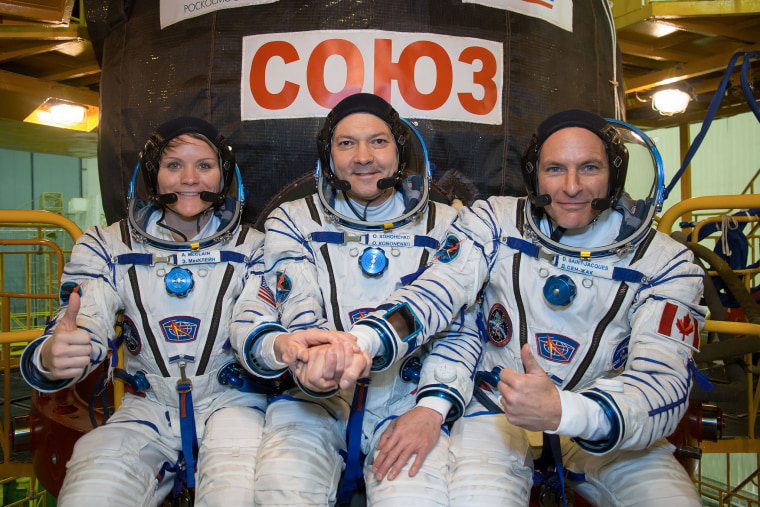A pair of astronauts and a cosmonaut will launch to the International Space Station on Monday, blasting off aboard a Russian Soyuz rocket less than two months after two other spaceflyers had to abort their launch when their Soyuz rocket malfunctioned.
NASA astronaut Anne McClain, Canadian astronaut David Saint-Jacques and Russian cosmonaut Oleg Kononenko are set to launch from the Baikonur Cosmodrome in Kazakhstan at 6:31 a.m. EST on Monday.
NASA will live-stream the liftoff beginning at 5:30 a.m. EST, followed by live coverage at 11:45 a.m. of the Soyuz capsule as it docks with the space station.
This will be the first crewed Soyuz launch since Oct. 11, when NASA astronaut Nick Hague and Russian cosmonaut Alexey Ovchinin made an emergency landing after their abortive launch.
Hague and Ovchinin returned safely to Earth, but the failure of their rocket means Monday’s launch will face additional scrutiny.
“Anytime you launch people, it’s a high-stakes operation,” said space policy expert John Logsdon, professor emeritus of political science and international affairs at George Washington University in Washington, D.C. “I don’t think the risk is any higher in this launch than any previous one. But the world will be watching.”
A month-long investigation by Russia’s space agency, Roscosmos, traced the Oct. 11 mishap to a single faulty sensor that prevented the booster’s second stage from separating from the first stage, Reuters reported. The sensor was likely damaged during assembly of the rocket, the investigation found.
“I’m sure that this investigation and fix was done on an accelerated schedule, but everybody involved realizes what the stakes are, and they’re not going to take shortcuts,” Logsdon said.
Following the investigation, which was conducted jointly with NASA, the Soyuz rockets were cleared for flight. On Nov. 18, a Soyuz booster successfully launched a robotic cargo ship to the space station.
In advance of what will be her first spaceflight, McClain expressed confidence in the Russian-built hardware. “The bottom line is that I would have got on the Soyuz rocket the next day,” she told ABC News. “I know that a lot of people see that as a failure — it’s often called that — but inside this community, where we mitigate risk professionally every single day, that was a success story.”
Since the retirement of the space shuttles in 2011, NASA and other space agencies have relied on the Soyuz to get crews to and from the space station. Boeing and SpaceX are developing capsules to ferry NASA astronauts to and from the orbiting outpost, but the companies aren’t scheduled to conduct crewed test flight until 2019.
Until then, the Soyuz is NASA’s only option.
Want more stories about human spaceflight?
- The human factor: What it will take to build the perfect team for traveling to Mars
- Going to Mars will involve all sorts of risks. Going bonkers might be the biggest.
- NASA names nine astronauts for Boeing, SpaceX flights in 'new era' for spaceflight
